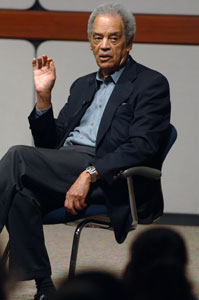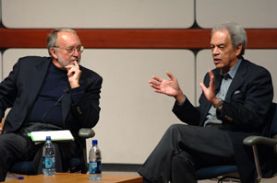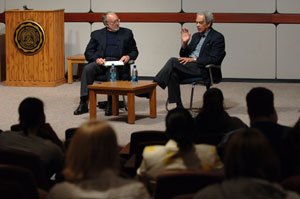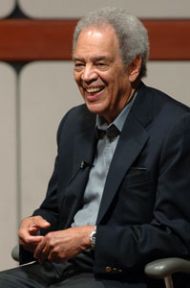"Common Ground" Increasingly Hard to Find in American Politics, Roger Wilkins Tells DePauw Audience
April 17, 2006
 April 17, 2006, Greencastle, Ind. -
April 17, 2006, Greencastle, Ind. - ![]() [Download Audio: "The Argument" - 143kb] "This administration can be demonstrated to be an administration which isn't taking care of the American future," says Roger Wilkins. The noted civil rights leader and journalist, who is Clarence J. Robinson Professor of History and American Culture at George Mason University, visited the DePauw University campus this afternoon to present The Gertrude and G.D. Crain Jr. Lecture, "Can the Democratic Party Survive George W. Bush?"
[Download Audio: "The Argument" - 143kb] "This administration can be demonstrated to be an administration which isn't taking care of the American future," says Roger Wilkins. The noted civil rights leader and journalist, who is Clarence J. Robinson Professor of History and American Culture at George Mason University, visited the DePauw University campus this afternoon to present The Gertrude and G.D. Crain Jr. Lecture, "Can the Democratic Party Survive George W. Bush?"
Wilkins -- a civil rights leader, journalist and historian -- told a crowd that filled Watson Forum at the Pulliam Center for Contemporary Media that the Bush administration can be blamed for soaring deficits, mounting problems with the health care system, and environmental neglect, among other things. While the Pulitzer Prize-winner says the war in Afghanistan was justified -- since the United States was going after the perpetrators of the terrorist attacks of September 11, 2001 -- the conflict in Iraq was poorly planned and executed.
With the mid-term elections seven months away, what should Democratic candidates say about Republicans and the Iraq war? ![]() [Download Audio: "War Talk" - 358kb] "They got us into
[Download Audio: "War Talk" - 358kb] "They got us into  that war on false premises," Wilkins asserted. "We have lost far, far, far too many of our young people to death or dismemberment or lifetime agony. We have achieved nothing and we should tidy up our business in Iraq and get our troops out of there as soon as possible. That's what I'd say."
that war on false premises," Wilkins asserted. "We have lost far, far, far too many of our young people to death or dismemberment or lifetime agony. We have achieved nothing and we should tidy up our business in Iraq and get our troops out of there as soon as possible. That's what I'd say."
On the issue of immigration, Wilkins says many Americans are in denial. ![]() [Download Audio: "Pecking Order" - 333kb] "The number of Latinos in this country is huge and growing," he told moderator Ken Bode, Eugene S. Pulliam Distinguished Visiting Professor of Journalism. "By the middle of the century, there won't be a majority; whites will no longer be a majority and Latinos will have far, far (outstripped the black population). So people are reassessing the way they stand in the pecking order.
[Download Audio: "Pecking Order" - 333kb] "The number of Latinos in this country is huge and growing," he told moderator Ken Bode, Eugene S. Pulliam Distinguished Visiting Professor of Journalism. "By the middle of the century, there won't be a majority; whites will no longer be a majority and Latinos will have far, far (outstripped the black population). So people are reassessing the way they stand in the pecking order.
The nation -- including Democrats in Congress -- "can't figure out what we think" about what to do about immigration, he adds. The recent, failed effort to reform immigration laws is a product of that indecision, as well as political posturing.
out what we think" about what to do about immigration, he adds. The recent, failed effort to reform immigration laws is a product of that indecision, as well as political posturing. ![]() [Download Audio: "Denying the President" - 265kb] "Harry Reid, the Democratic leader in the Senate, has concluded that it is his job to get Democrats elected this fall, and that giving George Bush the immigration bill that we wants is bad for Democrats," even though Sen. Edward Kennedy worked with the president to get the legislation approved.
[Download Audio: "Denying the President" - 265kb] "Harry Reid, the Democratic leader in the Senate, has concluded that it is his job to get Democrats elected this fall, and that giving George Bush the immigration bill that we wants is bad for Democrats," even though Sen. Edward Kennedy worked with the president to get the legislation approved.
An assistant attorney general in President Lyndon B. Johnson's administration, Wilkins later joined the editorial staff of the Washington Post, where, along with Carl Bernstein, Herbert Block, and Bob Woodward, he earned a Pulitzer Prize in 1972 for exposing the Watergate scandal that eventually forced President Richard Nixon's resignation from office. Wilkins also wrote for the New York Times and Washington Star, and for more than a quarter century has provided commentaries for National Public Radio.
century has provided commentaries for National Public Radio.
Roger Wilkins also discussed Americans' "righteous sense of aggrievement" and how that is fractionalizing the electorate. Whether its gay rights, abortion, or a recent conference that deliberated the "War on Christianity," Wilkins says it seems everyone has a cause, and an attitude that they're under assault. ![]() [Download Audio: "Righteousness" - 111kb] "Everybody is righteous. Everybody feels aggrieved. Nobody wants to deal. And nobody wants to listen. And that's hard," he stresses.
[Download Audio: "Righteousness" - 111kb] "Everybody is righteous. Everybody feels aggrieved. Nobody wants to deal. And nobody wants to listen. And that's hard," he stresses.
![]() [Download Audio: "Common Ground" - 297kb] "The kind of accomodation that you used to find in politics, and the kind of vital center that Arthur Schlessinger, Jr. once wrote about in American politics -- where moderates from both parties can come together and find common ground in what they both judge to be the national interest -- well, you just don't have that common ground anymore."
[Download Audio: "Common Ground" - 297kb] "The kind of accomodation that you used to find in politics, and the kind of vital center that Arthur Schlessinger, Jr. once wrote about in American politics -- where moderates from both parties can come together and find common ground in what they both judge to be the national interest -- well, you just don't have that common ground anymore."
Endowed by Rance Crain, president of Crain Communications and a member of DePauw's Class of 1960, The Gertrude and G.D. Crain Jr. Lecture Series honors Mr. Crain's parents. On April 5, David Keene, chair of the  American Conservative Union, deliberated the question "Can the Republican Party Survive George W. Bush?" Other previous Crain Lecturers have included: New Orleans-based journalist Clancy DuBos; Wall Street Journal reporter and 1996 DePauw graduate Aaron Lucchetti, who discussed his experiences covering Hurricane Katrina; award-winning reporter Jerry Mitchell and civil rights activist Rita Bender, the widow of slain civil rights worker Michael Schwerner; Samantha Power, author of A Problem from Hell: America and the Age of Genocide; Emily Wax (seen in photo at left), Africa Bureau Chief of the Washington Post, and her husband, Raymond Thibodeaux, who also covers the region for Cox News, Voice of America and the Boston Globe; Father Richard P. McBrien, Crowley-O'Brien Professor of Theology at the University of Notre Dame and a consultant to ABC News for papal events; political analyst Charlie Cook; military sociologist Charles Moskos; historian Douglas Brinkley, author of Tour of Duty: John Kerry and the Vietnam War; and Joe Trippi, who managed Howard Dean's presidential campaign.
American Conservative Union, deliberated the question "Can the Republican Party Survive George W. Bush?" Other previous Crain Lecturers have included: New Orleans-based journalist Clancy DuBos; Wall Street Journal reporter and 1996 DePauw graduate Aaron Lucchetti, who discussed his experiences covering Hurricane Katrina; award-winning reporter Jerry Mitchell and civil rights activist Rita Bender, the widow of slain civil rights worker Michael Schwerner; Samantha Power, author of A Problem from Hell: America and the Age of Genocide; Emily Wax (seen in photo at left), Africa Bureau Chief of the Washington Post, and her husband, Raymond Thibodeaux, who also covers the region for Cox News, Voice of America and the Boston Globe; Father Richard P. McBrien, Crowley-O'Brien Professor of Theology at the University of Notre Dame and a consultant to ABC News for papal events; political analyst Charlie Cook; military sociologist Charles Moskos; historian Douglas Brinkley, author of Tour of Duty: John Kerry and the Vietnam War; and Joe Trippi, who managed Howard Dean's presidential campaign.